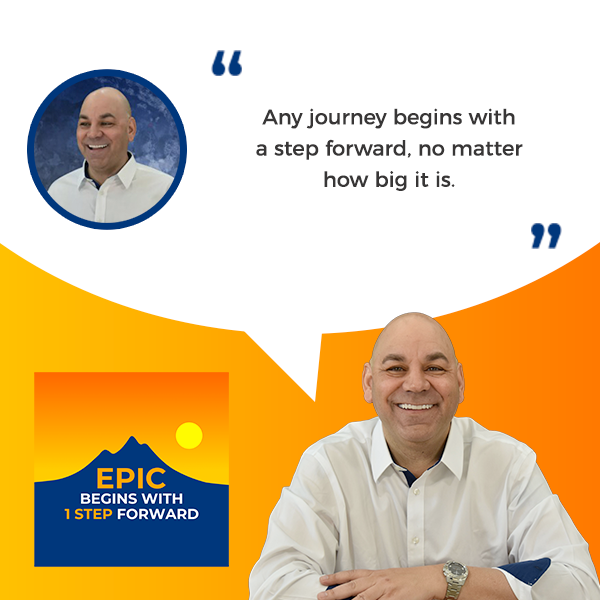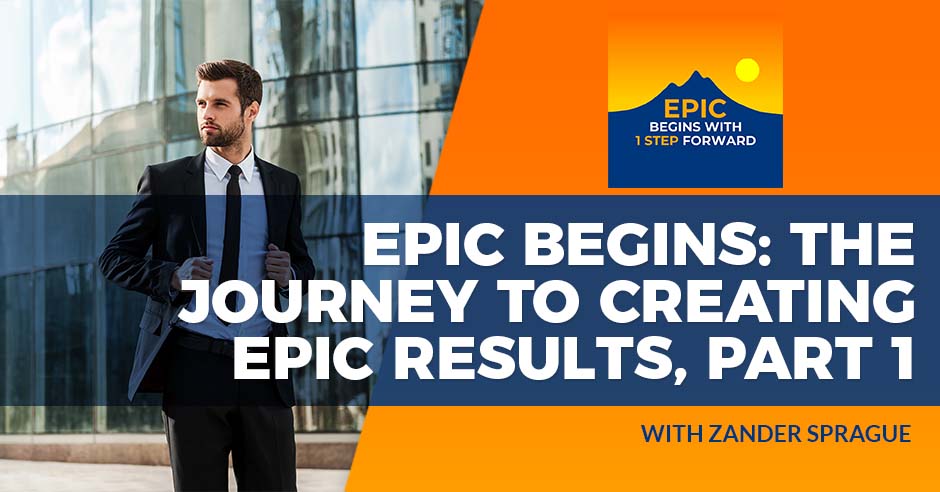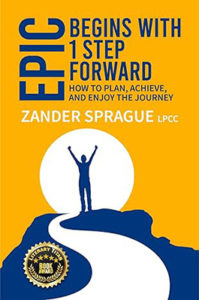In this podcast episode, Zander Sprague, a motivational speaker and author, shares insights into his new book launch plan, EPIC Begins With 1 Step Forward. Zander discusses his unique approach to writing, emphasizing the concept of the spoken author. He details the process of documenting his journey to become a more impactful speaker, reaching millions worldwide. The episode explores the challenges of traditional book writing and introduces the idea of discovering book content through weekly interviews. With the working title of Choice Champion, Zander’s book reflects his commitment to inspiring others with motivational messages.
—
Listen to the podcast
EPIC Begins, Part 1
Zander Sprague is demonstrating his new t-shirt. You’ve been on a roll. This is the start of the book launch plan. You have done so much. I’m super stoked. Before we get into all the things you’ve done in week one, I’d love you to say who you are, what you’re up to writing this new book in this new way, and why it’s meaningful for you and others to listen to this.
I’m a motivational speaker and author. I live in the Bay Area. I’m excited about this process because I am a speaker, not a writer, even though I’ve written two books. The way I was doing that was by dictating them. This whole idea of documenting my whole process of becoming even bigger as a speaker, having more people hear me, and hopefully helping millions of people around the world is something I’ve been working on for a while and frankly, not as successfully as I would like.
I was like, “My good friend Aurora can help me. She’s so fabulous. She knows so much.” This idea of using video and being able to talk and then be able to use tools that Aurora and I have discovered to transcribe it, and then I can mold that clay into a book, and all of that is exciting. The whole spoken author idea is so exciting and to be the first person who gets to do it with Aurora is awesome.
I’m so glad that when I explained the spoken author concept to you, you’re like, “Yes, I’m in.” It’s so crazy. The Gutenberg printing press was invented in the 1400s. It was revolutionary because, at that time, people had to memorize the stories or hand-write them out so that the information wouldn’t be lost. Stories are so important. There’s the DNA of humanity. It’s how we carry forward our wisdom.
Even though it’s 2020 and people have smartphones, YouTube, podcasts, and audio recorders, we are still writing books the old way. I typically interview people. I’ve got all these lovely interviews that I love but nobody gets to hear them. After many months of painstaking polishing up the words, a printed textbook is delivered and that’s great. It’s important to have a book for a speaker, yet something gets lost in translation. I’m like, “We’re doing this the wrong way around,” especially for you, Zander.

You’re such an ebullient energy and a natural speaker. To try to put that in the written word, little black dots on a white piece of paper, something gets lost in translation. We’re doing the discovery of the book content through these interviews. This is only for one week. Zander has already done a whole bunch of stuff, which he’s going to tell you in a moment. Chapter by chapter, we’ll be exploring in depth Zander’s outline for his book, which has got the working title Choice Champion but that could change as we go through this.
It’s interesting. Once you start working on something, I can’t even remember what the name of this chapter was but as we knew we were going to talk about it, you had this brainstorm like, “Let’s talk and call it EPIC Begins With 1 Step Forward.” I’m like, “That’s it.” You got the t-shirt, the URL, and the trademark going. You’ve got your office reorganized. You’ve got lighting and a mic. You’re on a roll.
It is amazing. I know you know this. When we are open to creativity, all of a sudden, we have that lightning moment where we come up with something. You had it with the whole spoken author idea. It wasn’t like you were percolating on it. You had this idea and was like, “That’s good.” I remember when I was sitting on the couch and thinking about the process with you. I’ve always liked the word epic. For me, it is so evocative of doing something big, challenging, and exciting. With that whole EPIC Begins With 1 Step Forward, I was like, “That’s great.” I remember I texted you right away.
What I love about it so much is that epic is such a big word and thing to lean into. It’s so juicy, exciting, motivating, and humongous but the 1 Step Forward is so doable. I love the yin-yang in one phrase. You nailed it.
Thank you. I feel that, which is to say, it is true that any journey does begin with a step forward, no matter how big it is. In the past, I ran marathons. I remember my coach saying, “A marathon starts with one step forward.” I will give credit where credit is due. Part of that idea was because I’ve had that saying. I’m on an epic journey here.
It’s frustrating when you can so clearly see it. I know you have had this frustration for a few years while working with me. What is so possible and not getting caught up with all of that, “I got to do this and that?” Frankly, the only way any epic journey begins is with one step forward. This will be documented. I will stumble. There will be things that I’m all excited about for one week and find out it didn’t work.
Let Zander’s epic journey but one step at a time inspire you. If you want to be a speaker or an author, and you have a big goal that’s eluded you, what’s one step that you could take? Befriend the journey. Missteps are part of the learning process. From all of the struggles I’ve had helping other clients publish books, I’m like, “What if I could solve that problem?” I then had the breakthrough. I was like, “Let’s do the spoken author idea and flip the order.”
Problems are valuable because you grow and learn. Maybe you’ll solve a problem and that could be a whole new business. I love Zander. For many years, we’ve worked together. He’s a wonderful life force. He’s so enthusiastic, present, and genuine. He’s always looking to help other people. I’ve seen for so long, and as he has too, he’s seen this vision of him speaking to a stadium of people. Yet like many people, he is a published author but writing is not his go-to. Speaking is his happy place.
This is a great opportunity to speak out your book in this format. I also want to emphasize that the word epic has a heroic element to it. It’s epic poems. People had to memorize the stories so they put them in poems so they could memorize them and put them to a song because they didn’t have the printing press, and then we’ve got videos and audios. It’s so important that everybody steps into their life as the hero of their journey, which is a huge thing. It releases any victim energy and woe-is-me energy. It takes one itty-bitty small step forward.
Here’s the thing, Aurora. In my life experience, there were things that I wanted. I started to run. I had always wanted to run a marathon but I had no idea. It seemed so impossible. I joined Team In Training, which is a fundraising for the Leukemia & Lymphoma Society. It’s a great organization. I joined it because I wanted help in getting to my goal. I started and ran a half marathon. I then ran a couple more. The next year, I ran a marathon. I remember that moment when I saw the 26-mile mark and I only had 0.2 to go. It’s the longest 0.2 miles of my life.
I put all of that time into running at 5:00 in the morning, the dark, the rain, and the long training runs and stuff. To achieve that goal was spectacular and such a moment. It was so epic for me. You were talking about how people think about what they want to do and they get stuck. I get stuck all the time with stupid stuff. Aurora and I were chatting and I was like, “What about selling the t-shirts?” Aurora’s like, “That’s great. The t-shirts are awesome but slow down. Don’t get bogged down with that.” We get bogged down with things that are the roadblocks in front of us.
Roadblocks affect everybody. I don’t know how you’ve done it but it seemed like you’re quite good at shifting roadblocks. I’d love you to talk about that a bit.
That’s a whole chapter.
Roadblocks are coming up later in another interview. Can you tease the decision part? When I’m working with people, I want them to be 100% committed. I’m so excited about things and enthusiastic that I don’t want to be more committed to my client’s goals than they are. It seems like 99% commitment is hard and 100% is easy. When you decided to run a marathon, was that the beginning of the epic journey, or was it when you started training? What are your insights on the decision part?
It seems like 99% commitment is hard and 100% is easy.
Choosing to do a marathon makes the training easy because you have a goal. This whole epic journey that I’m on, I have seen it. I’ve had very good reasons why I delayed the beginning of my journey. I was getting my hours for my professional clinical counseling license. I have that so I have to take the exam. With COVID, I was hoping I would have had it but I don’t. I’m still working on that.
I have experienced this many times. I’m making proclamations about what I’m doing and not doing it. I don’t want to be one of those people who says I’m doing something and I’m not. My first book, Making Lemonade: Choosing A Positive Pathway After Losing Your Sibling, is about my experience of losing my sister. I wrote that book and sat on it for five years. It was done. I said, “I’m coming out with a book.” I was no more coming out with a book than flying to the moon. It was done but I wasn’t doing anything to come out with the book.
How come? What was going on?
I don’t see myself as a writer. Writing has always been hard so the fact that I wrote a book, I didn’t believe that people would like what I had written but I got tired of hearing myself say, “I’m coming out with a book,” and I wasn’t. I didn’t want to be one of those people who for twenty years said he was coming out with a book and never came out with a book. I don’t like that.
It’s so common though because it’s difficult to put yourself out there. You’re easy with speaking. Most people are terrified of public speaking. You’re as happy as can be. It’s a moment to publish a book. That’s a big deal. Most people don’t set themselves up for success so oftentimes, the result of pressing publish on Amazon is crickets. It’s a good book.
Most people don’t set themselves up for success.
The second edition is out. It’s selling. I’m not an Amazon bestseller yet but that’s okay. It is helping people. This interesting experience, which those of you who are reading this will relate to, was for the first year that my book was out, when people told me how much they liked my book and how helpful it was, the interior dialogue that I was having was, “Really? They liked it?” I would have believed more if they told me it wasn’t worth the paper it was printed on than the fact that they liked my book. It honestly took me about a year of people telling me they liked my book, they found it helpful, they recommended it, and all of that before I started to believe that I’d written something good.
I can confess to that. I’ve published six books of my own and a bunch of others for clients. On Amazon, for my latest book, Thought Leader Launch, somebody who I don’t know wrote a nice five-star testimonial. He said, “Normally when I get an eBook after I read it, I delete it because I want to move on but this has got so many valuable things. I’m keeping it because I want to read it again and take action.” My response was, “Somebody I don’t know and didn’t ask arm-wrestle to give me a review.” He did so because he wanted to. This Imposter syndrome thing doesn’t go away the more books you publish but we can just go, “There’s that monkey mind.”
Here I am. I can so clearly see it. I’ve been dreaming about all of this. I want to do it. If there are parts of this that fail, that happens.
We could probably drop the if because if something’s working 100% of the time, we’re not playing at the edges of our comfort zone. I want to emphasize that this is an epic journey, especially for Xander but also for me because I’m launching my new book, Spoken Author, and my new idea about reversing the order. I have a lot going on here as well that matters to me to make a bigger contribution but I want to zero in on Zander for a second.
If something is working 100% of the time, we’re not playing at the edges of our comfort zone.
It’s week one of his epic journey but also during the Coronavirus period in 2020. There is a pandemic out there. There are no conferences or live events. They’ve all been canceled because you cannot have a public gathering. I can’t think of a more difficult time in history to launch as a public speaker. Zander decided, “I’m going for it. I’m not going to put this dream on hold or wait for the wind conditions to be different. I’m not going to wait any longer.” If you are also wanting to be an author or speaker, I would love you to be inspired by Zander’s journey and not put your dreams on hold. I’d love you to comment on that, Zander.
My life experience is that life is short. You don’t know when your life might end. I’m not trying to be modeling but I look at my sister. She was 30 years old and was murdered. It was horrible. You don’t know. They’re all those clichés, “You only go around once,” and all of that. Any of us can lean into, “I want to do this.” Even though there may be lots of people who think that you’re crazy for doing it and you think you’re crazy for trying it, you don’t regret trying.
Life is short. You don’t know when your life might end.
All of us have done stuff in our lives that we weren’t successful. Perhaps, we were disappointed. However, you learn something from that. You’re putting yourself out there. Think about Olympic-level athletes. There was a guy that I met many years ago who was a swimmer. He was from New Zealand. He ended up winning a bronze medal in the Olympics.
He said, “I trained for 13 years for 30 seconds.” That’s exactly true. Think about people who put that amount of commitment in and they don’t succeed or don’t hit the goal that they want but that doesn’t stop all of those people from still pursuing that goal, even though part of them has to know that their chance of success is probably statistically quite low.
What I like about this show is it reframes success as the journey itself, as opposed to that 30 seconds with the gold medal.
I will come back and talk about marathoning because it is so true. The goal is to cross that finish line. In the meantime, there are 26.2 miles that I have to cover to have that last step to cross that finish line. There’s a lot that has to go on for me to then be able to hit that goal.
Important Links


